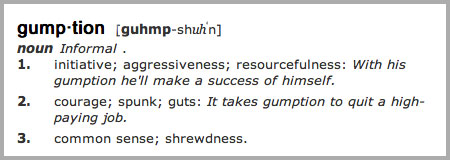Are you stuck somewhere? A job. A relationship. A funk in your life that feels like you are askew – living for obligation, not for who you really are, or dreamed of being. Most people feel that way sometimes.
There is a skill for getting out of those ruts. It goes by lots of names, but I like to call it gumption. Here is the definition:

I think a lot about what we learn – as a culture, as individuals – from the recession. I know, we are supposed to wait for companies to create jobs, and Wall Street to solve the mess they created. But somehow, that feels unsatisfactory to me.
That seems, to me, like we are a culture waiting for others to set things straight. To make it right. That our own role in this mess is entirely dependent on others getting us out. I suppose what I am getting at is this: we need more gumption. We need for each of us to turn that gumption knob on the faucet on ALL THE WAY, until it is pouring out. And we need turn off our TVs long enough to encourage our neighbors to turn their gumption knobs on all the way too.
But that’s not enough.
Gumption needs to be taught in school. It needs to start early. Okay, we can use a more formal name: entrepreneurship needs to be taught in school.
So what would this look like? What are the skills inherent in gumption -er- entrepreneurship?
We need to teach how to take action, even when there are risks. Why? Because too many people are trapped in lives they are unhappy with, but frozen with inaction due to their fear of the “risk.”
We need to teach personal responsibility, not as a negative, but a positive. To push the red shiny button that says “IGNITION,” and take full responsibility for what happens next.
We need to teach how to find new paths, not just how the existing system already works.
We need to teach how to turn an idea into a reality.
We need to teach debate and public speaking.
We need to teach how to communicate with others, even when we disagree. Especially when we disagree.
We need to teach negotiation.
We need to teach how to listen, how to care, what empathy is and how it can lead to action.
We need to teach how to have strong beliefs, and respect others who have strong – but opposite – beliefs as yours.
We need to teach skills that will form the backbone of a fruitful personal and professional life. One where we contribute to a community, not just have a job.
We need to teach beyond theory. Beyond spending 21 years planning for a life, emerging with a wonderful body of knowledge, but few real accomplishments beyond grades.
We assume many of the things listed above are taught in school as a byproduct of other activities. That gumption is taught by having kids cram for a test. I think something is lost there. Too much is assumed. Key issues are not addressed.
Then we measure by grades – oftentimes arbitrary measures of short-term memory. We teach to the test and kids spend all night cramming for it. We teach: win/lose – pass/fail – right/wrong – in a world where everything is a mixture of both.
Where is the only place that gumption is ever really focused on directly in school? Sports. That is where they teach you teamwork, how to deal with interpersonal issues, assessing competitors, moving past goals, the value of practice but the need for execution, ability vs passion, and so much else.
But you know what? I was never all that into sports. I appreciate them for the reasons I mentioned above, and I like how they can be used as a metaphor. But I know a lot of people who could care less about sports. And for those who I know who DO care about sports, some of the positive attributes listed above are lost on them. It’s all about the adrenaline rush of the win. Sports are a wonderful petri dish of the “thrill of victory, and the agony of defeat.” But I wish the wonderful lessons of sports were taught more directly elsewhere.
I will leave you today with one of my all-time favorite TED talks, this one by Nigel Marsh on the topic of work/life balance. The story at the very end is simple, yet profound. His message:
“With the smallest investment in the right places, you can radically transform the quality of your relationships, the quality of your life, and the quality of society.”
Here’s the video:
Thanks!
-Dan
